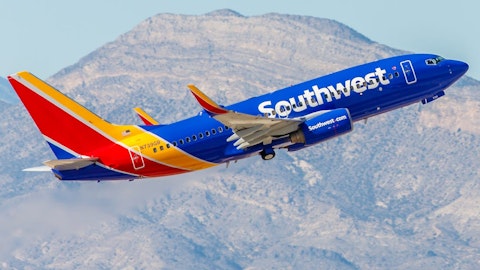Our pay rates are going to always be — vary depending on the timing of contracts, but always basically going to be at the top of the industry. If you’re a pilot, United has the most growth opportunities and most opportunities, the fastest path to captain. The most widebodies of any airline by far in the country, like we’re the place to go. And people are actually giving up their seniority at all of our competitors for the opportunity to come and have a future at United that’s a testament to what all the people of United have accomplished and how bright we feel like the future looks.
Operator: Next is Alison Sider from The Wall Street Journal.
Alison Sider: Just wanted to ask about the FAA outage last week. And I don’t know how you’re thinking about that. Is there a concern that there are other sort of — of these systems that are vulnerable or that you think of as single points of failure and how you’re thinking about it? And what kind of conversations you’ve had with the FAA since?
Scott Kirby: So, I think this ought to be a wake-up call to — for all of us in aviation — something many of us in Aviation have been saying for a long time that the FAA needs more resources. By the way, I think they do an amazing job. During the Christmas struggles with the weather, a bunch of great things that they did. But 2, in particular, the water main break that flooded the tower in Newark and the same thing happened at one of the towers in Chicago, and they really quickly moved into backup facilities and kept the operation running. I mean, just a lot of people jump through a lot of hoops and deserve a lot of credit for that. But the hard facts are the FAA’s budget in real terms, it’s lower than it was 20 years ago. But the amount of work that they’ve been asking to is significantly higher.
Huge resources devoted to space launches, drones, thousands of people were working on aircraft certification programs in the aftermath of the MAX disaster. And so, they’ve had to rob Peter to pay Paul. And they’ve done — asked to do more, and they’re doing it less money. There’s fewer controllers than there were 30 years ago. And it’s people, it’s technology. And look, here in the United States, we should have a world-class best aviation system in the world. And we’re putting at risk if we don’t invest in it. And this is infrastructure. It was great that we passed a bipartisan infrastructure bill. This ought to be bipartisan as well, by the way that we passed the bipartisan infrastructure bill. But this isn’t concrete, but modern systems, modern technology and the right number of people for the FAA is an infrastructure investment that will pay dividends many times over for the country.
And so, I hope that what this is, is an opportunity for us to look at this just like we looked at the country at the infrastructure bill in a bipartisan way, get the agency, the resources that they need because we have asked them to do more, and we’ll all be better off.
Alison Sider: And then, if I could ask one more just on restoring flights to China. Are there like approvals either in China or the U.S. at the government level or like diplomatic things that need to happen in order to ramp that flying back up?
Andrew Nocella: There are. At this point, United Airlines holds the rights to fly 4 flights per week to China. We intend to convert our current one-stop service to nonstop sometime in the next few weeks, hopefully. But we do not hold rights at this point to increase our service any further. And I believe that is an industry-wide type of situation. So, at this point, there’s no green light to go beyond what we’re currently flying.
Operator: Next is David Schaper from NPR.





